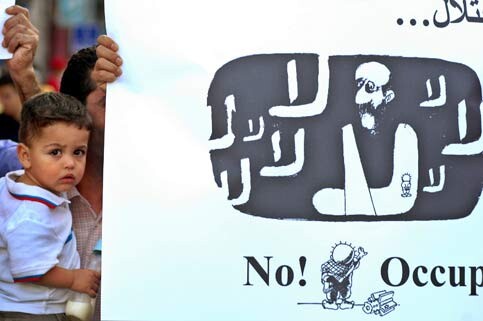The Electronic Intifada 13 August 2006

Rejecting the Israeli-U.S. version of history: Palestinians demonstrate in the West Bank city of Ramallah against the ongoing Israeli military campaign in Lebanon, 12 August 2006. (MaanImages/Mushir Abdelrahman)
I spent the first two weeks of the newest Lebanon war trying to ignore it. I was studying for the California bar exam, and as I kept reminding myself, I wouldn’t make much of a human rights lawyer without a license to practice law. My first career stop was to be Gaza, working for the Palestinian Centre for Human Rights in the Jabalya refugee camp. Seeking American assistance in gaining an entry permit into Gaza through Israel, I instead got a stern rebuke from the U.S. Consulate and a recital of the latest State Department travel advisory.
Disappointed, I set my sights on the West Bank, where I had worked for a summer two years ago. Recently, however, I learned that my cousin, a U.S. and Jordanian national, was denied re-entry to the West Bank after visiting family in Amman. He, like many of the estimated 45,000 U.S. nationals living in the West Bank, now faces the Hobson’s choice of living apart from his wife and two children or accepting a second, and this time complete dispossession of Palestine, the first being our family’s eviction from the Mount of Olives in Jerusalem following the 1948 War.
The travel advisory of 19 July sent my way by the U.S. Consulate describes this new Israeli policy in the following sterile language:
Forget about trying to read a logic into the exclusion of repeat visitors to occupied Palestine. By now it is clear that Israel has marked every Arab as a terrorist-in-waiting. This explains the bombing of Gaza’s sole power plant, Lebanon’s sole international airport, and most recently a Lebanese power plant, spewing oil into the Mediterranean and destroying the Lebanese tourism industry for years to come. The Bush administration’s refusal to criticize Israel for attacking civilian infrastructure, which are acts of collective punishment, aside from a tired and unheeded call for “restraint,” shows a convergence of official U.S. and Israeli worldviews on this point.
The Government of Israel is increasingly denying re-entry to the West Bank by American citizens who work and/or reside there with temporary visas. American citizens, including aid workers, religious workers, and property owners who left the West Bank so they could renew entry visas by return from Jordan or other countries are increasingly being denied re-entry by Israeli authorities, who consider them “repeat visitors”.
The real story behind the phrase “repeat visitors” is America’s acceptance of the Israeli narrative of history. Put simply, time and history begin when Israel and the U.S. says it does.
According to this view, the Israeli invasion of Gaza “began” with a Palestinian raid on an Israeli military post in which two Israeli soldiers were killed and another “kidnapped.” This attack was outrageous, an act of war even, because it took place on sovereign Israeli territory after the Israelis had withdrawn from Gaza. After months of crude rocket fire from Gaza into Israeli border towns, the kidnapping was the final straw. The Palestinians had a choice between rebuilding Gaza and further provoking Israel, so the refrain goes, and they chose the latter.
Clearly, history does not begin in 1948, when the refugees created by the Israeli state, who with their descendants comprise 900,000 of Gaza’s 1.4 million inhabitants, were corralled into the tiny costal strip. More than a half-century of rejecting international law, in the form of multiple Security Council resolutions, paid dividends for Israel in the form of the Oslo Accords. The PLO agreed to defer the refugee question until another day, and in reality banished it to history.
It does not begin after 1967, because the U.S. and Israel would be at a loss to explain what makes Israeli territory inviolable when they treat Palestinian territory as terra nullius: fit for Israel’s taking wherever and whenever a security or religious justification can be found.
Neither does it begin in 1993, because the Declaration of Principles, the first component of the Oslo Accords, declared the West Bank and the Gaza Strip to be a single, inseverable territorial unit. An Israeli withdrawal from Gaza is as much a non-event in the Palestinians’ fight for self-determination as a Hizbollah pledge to attack only Haifa but not Tel Aviv would be to Israel’s latest campaign.
Even earlier this year is too distant a starting point, lest the U.S. be called upon to respect the will of the Palestinian electorate in a poll that it insisted on as a precondition to resuming negotiations. Instead, the U.S. and Israeli leadership plotted the collapse of the Hamas-led government by initiating a humanitarian disaster in Gaza and, when a suitable pretense developed, by predictably branding Palestinian ministers and parliamentarians as “terrorists” and rounding them up.

Israel’s history of oppressing Gaza predates last month’s crossborder raid: A Palestinian boy sits on the rubble of a destroyed house after the Israeli incursion at Rafah refugee camp, southern Gaza Strip, 6 August 2006. (MaanImages/Hatem Omar)
Israel had no use for Gaza: it was an economic and military drain, with no trace of Jewish history and, after peace with Egypt, no strategic value. Deified former prime minister Yitzhak Rabin once publicly hoped that it would fall into the sea. Israel is content to let the Gazans huddle in Gaza and never leave. Proclaim yourself Palestinians, better yet, proclaim a Palestinian state there and renounce your ties to your former cities and villages, the ruins of which you will never again see.
On the West Bank, the cantonization of the native population by means of the separation wall, apartheid roads, checkpoints and identity cards is as-yet incomplete. In the interim, the Israeli military manually tightens the noose by barring access to Jerusalem, the Jordan Valley, and travel between the northern and southern cities. Palestinians who can defy this concentration program by flashing an American passport threaten the regime and must be excluded entirely.
The old Fateh government was powerless to stop the erosion of Palestine; in these circumstances who can fault the electorate for voting in what is properly described as the “reactionary ideology” of Hamas? Apparently, the State Department can, unequivocally placing blame on the Palestinian side in the same travel advisory:
The conduct of the Palestinian Authority government led by Hamas and actions such as the kidnapping of an Israeli soldier by Hamas have caused increased instability in the West Bank and the Gaza Strip.The Hamas government is not objectionable to the U.S. and Israel primarily because it condones the rocket fire into Israel. The rockets are nihilistic violence — as morally indefensible as the suicide bombings they replaced, and far less effective in convincing the Israeli public of the need for a political solution — and speak to the waywardness of the Palestinian national movement. The real threat lies with Hamas’ appreciation of the Palestinian Authority for what it is: an overgrown town council accountable to the colonial authority, and which should disband when it is stripped of all its competences. Now that the Palestinian leadership is toying with this idea, expect the U.S. to order Israel to quit Gaza for a time. Neither wants to pay for the costs of Israel’s occupation again, and both know where the blame of the international community will lie if it happens.

Refugees from the war on Lebanon are living in the parks of Beirut, 4 August 2006. (MaanImages/Raoul Kramer)
Which takes us back to the Lebanon War. The ahistorical, atemporal description of the conflict was replicated here: Hizbollah’s cross-border attack and capture of two Israeli soldiers was unanimously decried as brazen, unprovoked, and an act of war. The U.S. president betrayed his long-demonstrated feelings that the value of the Arab world is strategic rather than human by seeing a “moment of opportunity” in Israel’s razing of Lebanon’s poorest areas, even as its confrontation of Hizbollah failed.
The U.S. and Israel have alternately characterized the timing of Hizbollah’s raid, executed while the Israeli military flattened Gaza in search of its captured soldier, as (1) Iran’s use of a proxy army to divert attention from the debate over its nuclear program, unrelated to the situation in Palestine; and (2) a one-two bunch by the Hamas and Hizbollah, under the aegis of Iran and Syria, all of whom together form an “axis of terror” in the Middle East.
But the Iran bogeyman cannot obscure, to Israel’s chagrin, the fact that the Palestine question runs everywhere in this latest episode. Syria has a price: a return of the land seized in 1967 and 1973, from the Golan Heights to the shores of Lake Tiberias, including water rights. The stumbling block is that the Bush administration’s belief in its own messianic mission in the Arab world apparently survived the Iraq disaster, and does not allow negotiation or even talk with bad regimes like the Assad government. At this hour, Israel would gladly give Syria everything it wants if it meant a peace treaty with Syria and Lebanon, the end of Hizbollah on its northern front, and the total isolation and capitulation of the Palestinians. Iran is too far removed, geographically and historically, to make its influence felt in the Levant without a strategic Arab partner in the area.
The “opportunity” Bush saw in the outbreak of war was an Israeli annihilation of Hizbollah, strain on the Syria-Iran relationship, Assad on the ropes again (as he was at the height of the Hariri assassination investigation) and forced to expel the Palestinian resistance groups based in Damascus. This, in conjunction with the merciless Israeli campaign in Gaza and lockup of much of the “terrorist” Palestinian government, would allow Israel to demarcate Palestine on its own terms. Syria would then be Iraq redux, an isolated, crippled state trying in vein to forestall an American or Israeli invasion and regime change.
Now, with the Israel-Hizbollah war a stalemate at best and the Israeli deterrence at a historic nadir, Olmert and Bush know that the Israeli public has lost its nerve and its stomach for a unilateral withdrawal from one inch of the West Bank. Twenty years elapsed between the Israeli occupation of the West Bank and Gaza and the first intifada. Eight years elapsed between the start of the Oslo process and the second intifada. The Gaza withdrawal has only exacerbated the Palestinians’ suffering, and without a diplomatic track to speak of, a third intifada is imminent, one that likely will not be constrained by the sham of Palestinian self-governance.
In the buildup every Israeli provocation, like the sealing of Gaza from the outside world and the exclusion of Palestinian-Americans from their ever-more-fragmented territory, will create ripples through the region-at-large in a way not seen since the Camp David Accords in 1977 broke the Arab states’ rejection of Israel. Despite the U.S. and Israeli abuse of history, the Palestine question that has lingered since 1948 will continue to predominate in the region. As a result of this errant Lebanon War, the fault lines run deeper and wider than ever, and a much larger conflagration looms on the horizon. Perhaps I should be thankful that, by virtue of my American passport, I cannot be there to witness it.
Omar Yousef Shehabi is a 24-year old Palestinian-American lawyer. He has worked for the UN Development Programme in Ramallah as a law clerk for the Palestinian Authority Ministry of National Economy. He can be reached at oshehabi@gmail.com.
Related Links




